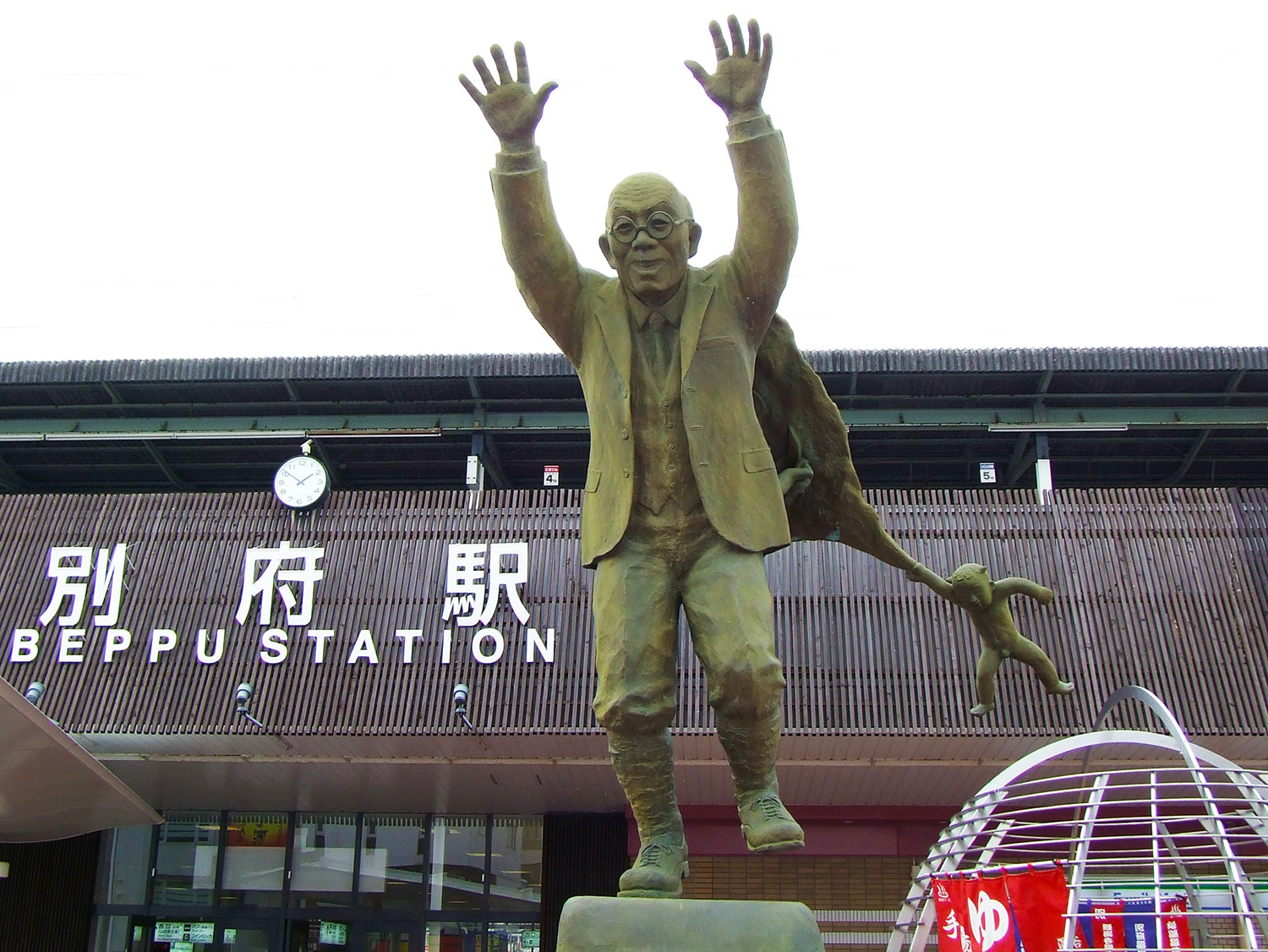
Soba Cafe Yuhi
Soba Yuhi Cafe takes its name from the glorious sunsets, which here bask the placid waters of the…

Dignified statues celebrating heroines and heroes, stateswomen and men, and local personages are common in many countries around the world, and Japan is no different. Found in front of Beppu Station, however, is perhaps one of the least typical representations found anywhere. Leaping with hands held aloft, a broad smile across his face, and a childlike imp hanging onto his coats tails is one of the more unusual; an eye-catching towering bronze likeness celebrating the flamboyant life of Aburaya Kumahachi (1863-1935) and his contribution to Beppu’s development as a resort town, and as the progenitor of Japan’s modern tourism industry.
Born in Uwajima across the waters of the Bungo Channel from Beppu, by his early thirties Aburaya had first made and then lost a fortune trading rice futures in Osaka. Broke, he travel to America, where he led an itinerant life for three years, became a Christian and picked up a renewed entrepreneurial spirit. He returned to Japan, and after a brief and unsuccessful attempt once again as a futures speculator, settled in Beppu with his wife. Here he set about reviving his fortunes with the establishment of the Kamenoi Ryokan in 1911. Espousing the motto ‘Never forget the entertainment of travellers’ he imbued his business with a spirit of service. He followed with the Kamenoi Besso in Yufuin in 1921, and then rebuilt the Kamenoi Ryokan as a western-style Kamenoi Hotel in 1924. Soon after followed Kamenoi Bus, a sightseeing coach company with, for the time, the novel innovation of female bus guides. The company’s first tour, Beppu Jigoku Meguri, remains popular to this day.
To publicise his businesses and Beppu’s wider attractions, during this period Aburaya helped set up the town’s first tourist association. While espousing his philosophy and radical ideas on hospitality, he employed the popular cartographer and artist of the day, Yoshida Hatsusaburo, using his own funds to successfully spread Beppu’s appeal throughout Japan.
Perversely perhaps given his focus on hospitality, as a Christian teetotaller he initially refused to serve alcohol in his establishments, and only relented when pressured by his guests. Financial pressures may have also played a part in this, as, after his death in 1935, both the Kamenoi Hotel and Kamenoi Bus were disposed of to repay debts.
Besides Aburaya’s three Kamenoi businesses, all of which are well-known institutions to this day, he had a quay built in Beppu for the safe disembarkation of ships’ passengers, and created the catchphrase ‘As Fuji is for mountains, the Seto-uchi (the Inland Sea) is for the seas, Beppu is for onsen hot springs’. This he had engraved on signs and beginning with the foothills of Mt. Fuji, set them up around Japan. He was also known to erect signs falsely proclaiming ‘Beppu Onsen: New Kamenoi Hotel planned construction site’ on empty lots in Fukuoka, Osaka and Tokyo. Aburaya proposed the construction of the Yamanami Highway, and opened a golf links in Beppu that brought sport and onsen bathing together for the first time.
Not surprisingly, Aburaya is fondly remembered in Beppu. Hence, his good-humoured figure being placed in a prominent position at the front entrance of Beppu Station.